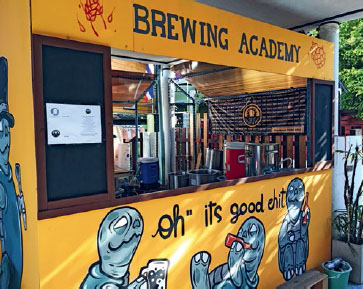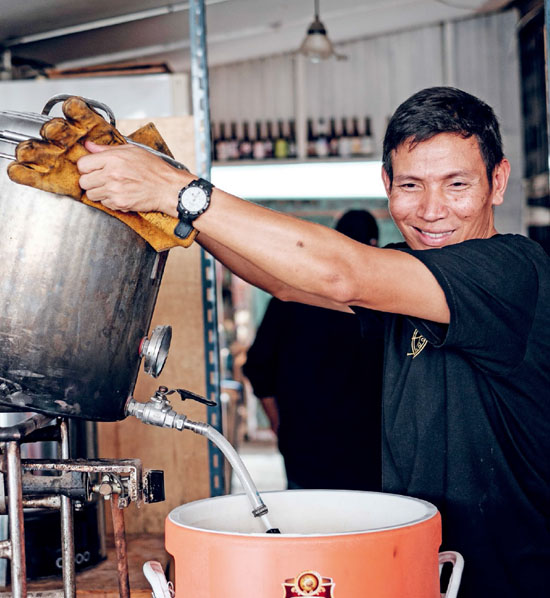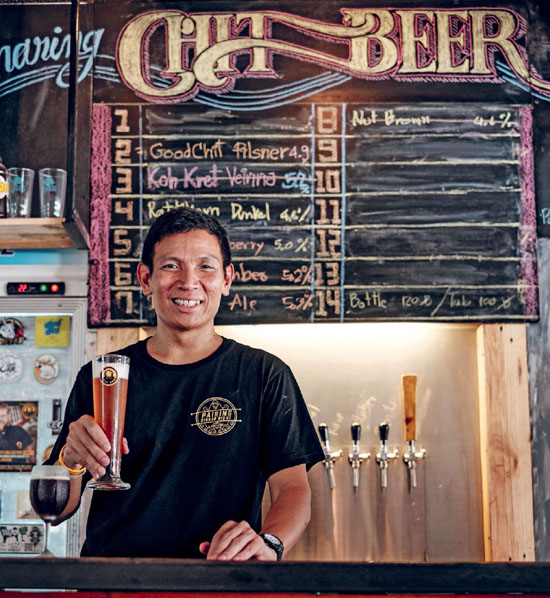
BANGKOK, THAILAND
The fighting spirit took root in Wichit “Chit” Saiklao at 17 years old when he received a military scholarship to study abroad. He chose the Virginia Military Institute and later attended Georgia Tech for his PhD in electrical engineering—and an introduction to homebrewing. On weekends, he hung out with a friend and sampled his homebrew. The taste impressed him less than the possibility. One day I’m going to brew, thought Chit, who imagined he’d be 55 or 60 by then and the hobby would carry him into old age. Chit forgot about this promise to himself and returned to Thailand in 2003.
Then, one fateful night in his forties he found himself at a Bangkok bar. The beer list stretched 100 deep, and hundreds of empties doubled as decoration. “I kept asking, ‘What’s going on? Where have I been?’ ” he recalls.
Back home, he went online and bought a Mr. Beer kit from Amazon. The first batch failed, flat and sweet, as did the second. Maybe he wasn’t cut out to be a brewer. A year later, he bought his home on Ko Kret, a small island where cars are banned and coconut and bananas trees grow tall and lush. At a friend’s urging, he brewed one last batch in Mr. Beer.
“I read the menu, line by line, one more time, and the last line said, ‘Sprinkle the yeast under the lid,’ ” Chit recalls. Wait, yeast?
He thought the small packets were silica gel and had been throwing them away. He pitched the yeast, bubbles bubbled, and success. He invited friends over for a taste. “ ‘Chit, am I sitting in Bavarian fields somewhere in Germany?’ ” he recalls a friend saying.
He started brewing all-grain by his thirteenth batch, importing ingredients from an Idaho brew shop, the only one that shipped to Thailand then. (Sourcing malts and hops is easier now, though fresh liquid yeast remains elusive.) Word of his beer spread online, and he freely poured pints for anyone who came to his home. Gifts beget a business, and in time he found himself operating an island brewery.
Thailand’s rigid 1950 Liquors Act forbids homebrewing, though, and that includes owning any equipment. Break the law, and you’ll risk fines and even jail time, especially if, for example, you open an illicit brewery and bar on an island 12 miles north of Bangkok. “I sell my beer. I’ve been caught three times already.”



NOT SO FUN FACT
The maximum penalty for homebrewing in Thailand is six months in jail and a fine of 5,000 baht (approximately $150).
Fines won’t stop this Thai army colonel and homebrew revolutionary, though. Here in paradise he operates Chit Beer, an open-air compound consisting of a brewery and bar. Slogan: “Oh, it’s good chit.” His customers sip lemongrass kölsch and chrysanthemum pale ale while watching boats glide down the Chao Phraya River. More than 1,000 students have graduated from his homebrewing boot camp, and scores of them have launched their own underground brands.
“The way to liberate homebrewing is to create an army of brewers,” says Chit. “A brewer is the ambassador of craft beer. Once they go out and they brew a good beer, the word spreads out wider and wider. In 2020 things are going to change.” That’s his target year for legalizing homebrew in Thailand, where 60 million people make do with just two lagers: Singha and Chang. “When I looked around Thailand, I saw a lot of beer monopolies. I feel that something was wrong in the industry, and I would like to change it.”
Chit is pursuing that mission with Brewhouse of Friendship, an open-source brewpub where brewers can do R&D batches. He envisions a future with five or six open-source operations scattered across Thailand offering havens for homebrewers to brew up a national identity. “My hobby has a higher purpose to change something and spread good things,” he says.
Running one multifaceted business would prove daunting for many people, but Chit also teaches electrical engineering at a military academy, oversees a couple of IT companies that he founded, and he opened Turtle Bar, which specializes in craft beer from Thailand and around the world. With each project, he gathers more energy and inspiration. “It’s about correcting something that’s been wrong in Thailand for a very long time,” he says.

ADVICE
“Just brew. Once you’ve got your first sips of the beer, you can keep brewing and keep improving. Make the first batch as easy as possible. Once they brew the beer, people feel empowered like they can do something for themselves. That will make everything different.”

BREWER SPOTLIGHT
Chicago-area homebrewer BJ Pichman now helms Forbidden Root, which makes botanically driven beers flavored with cardamom, licorice root, sandalwood, and more. His Fernetic recasts Fernet-Branca liqueur as a beguilingly aromatic beer.